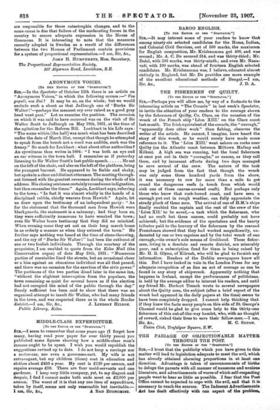THE FISHERMEN OF QUILTY.
(To THE EDITOR OF THE " SPECTAT011:9 SIR,—Perhaps you will allow me, by way of a footnote to the interesting article on "The Coracle" in last week's Spectator, to invite the attention of your readers to the courage shown by the fishermen of Quilty, Co. Clare, on the occasion of the wreck of the French ship Leon XIII.' on the Clare coast last month. The Irish equivalent of the coracle, the " curragh," "apparently does other work" than fishing, observes the writer of the article. He cannot, I imagine, have heard the story of this wreck, or he would surely have made some reference to it. The Leon XIII.' went ashore on rocks near Quilty (on the Atlantic coast between Miltown Malbay and Kilkee). A high sea was running, but the local fishermen at once put out in their " curraghs," or canoes, as they call them, and by incessant efforts during two days managed to save several of the crew. The nature of the task may be judged from the fact that though the wreck was only some three hundred yards from the shore, it was necessary to row for more than a mile to get round the dangerous reefs (a touch from which would sink one of these canvas-covered craft). But perhaps only those who know that rock-bound coast, and have seen a curragh put out in rough weather, can fully appreciate the steady pluck of these men. The arrival of one of H.M.'s ships finally enabled the captain and the rest of the crew of the 'Leon XII.' to be saved,—a task which the fishermen, who had no craft but these canoes, could probably not have achieved; but the evidence of the spectators and the hearty tributes paid to the bravery of the fishermen by the rescued Frenchmen showed that they had worked magnificently, un- daunted by one or two capsizes and by the total wreck of one curragh,—its owner's sole means of livelihood. These fisher- men, living in a desolate and remote district, are miserably poor, and a subscription fund for them is being raised by Mr. H. R. Glynn, of Kilrush, who will be glad to furnish any information. Readers of the Dublin newspapers know all this. But I have looked in vain in the London Press for any adequate recognition of as fine an act of courage as can be found in any story of shipwreck. Apparently nothing that happens in Ireland, except the performances of politicians, is held by the average editor to interest his readers, and until my friend Mr. Herbert Trench wrote to several newspapers about the Quilty men, the subject (after a brief report of the wreck had appeared in the daily papers at the time) seems to have been completely dropped. I cannot help thinking that if they knew the facts many people on this side of St. George's Channel would be glad to give some help to the thirty-one fishermen of this out-of-the-way hamlet, who, with no thought of reward, risked their lives to save their fellow-men.—I am,
Sir, &c., M. C. SETON. Union Club, Trafalgar Square, S.W.


















































 Previous page
Previous page